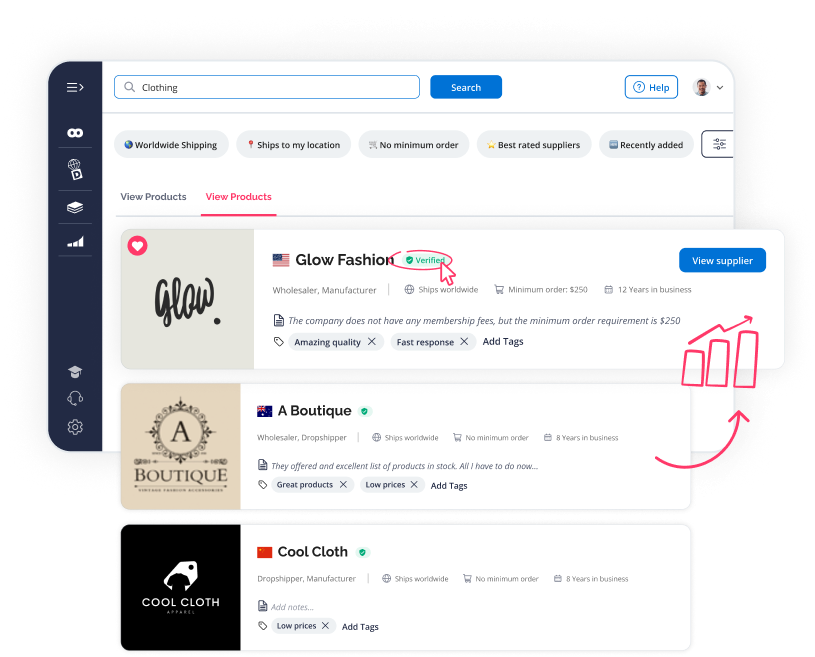Wholesale T Shirts for Ecommerce Sellers
When sourcing t-shirts, consider their versatility and timeless appeal, making them a staple in any wardrobe. Look for suppliers that offer a variety of fabrics, fits, and eco-friendly options to cater to diverse customer preferences. Additionally, prioritize suppliers with reliable quality control and fast shipping to ensure a seamless experience for your customers and a strong brand reputation

Here’s a selection of suppliers waiting for your call
Manufacturer Supplier
 Verified
Verified
 Join to contact this supplier
Join to contact this supplier
 No Minimum Order
No Minimum Order
 10 Years in SaleHoo
10 Years in SaleHoo
Products stocked
About
Wholesale Supplier
 Verified
Verified
 Join to contact this supplier
Join to contact this supplier
 No Minimum Order
No Minimum Order
 6 Years in SaleHoo
6 Years in SaleHoo
Products stocked
About
Manufacturer Supplier
 Verified
Verified
 Join to contact this supplier
Join to contact this supplier
 No Minimum Order
No Minimum Order
 8 Years in SaleHoo
8 Years in SaleHoo
Products stocked
About
Wholesale Supplier
 Verified
Verified
 Join to contact this supplier
Join to contact this supplier
 No Minimum Order
No Minimum Order
 2 Years in SaleHoo
2 Years in SaleHoo
Products stocked
About
Wholesale Supplier
 Verified
Verified
 Join to contact this supplier
Join to contact this supplier
 No Minimum Order
No Minimum Order
 26 Years in SaleHoo
26 Years in SaleHoo
Products stocked
About
Manufacturer Supplier
 Verified
Verified
 Join to contact this supplier
Join to contact this supplier
 No Minimum Order
No Minimum Order
 18 Years in SaleHoo
18 Years in SaleHoo
Products stocked
About
Manufacturer Supplier
 Verified
Verified
 Join to contact this supplier
Join to contact this supplier
 No Minimum Order
No Minimum Order
 12 Years in SaleHoo
12 Years in SaleHoo
Products stocked
About
Wholesale Supplier
 Verified
Verified
 Join to contact this supplier
Join to contact this supplier
 No Minimum Order
No Minimum Order
 9 Years in SaleHoo
9 Years in SaleHoo
Products stocked
About
Wholesale Supplier
 Verified
Verified
 Join to contact this supplier
Join to contact this supplier
 No Minimum Order
No Minimum Order
 8 Years in SaleHoo
8 Years in SaleHoo
Products stocked
About
Wholesale Supplier
 Verified
Verified
 Join to contact this supplier
Join to contact this supplier
 No Minimum Order
No Minimum Order
 9 Years in SaleHoo
9 Years in SaleHoo
Products stocked
About
Other product suppliers available...
Trusted by 137,000+ entrepreneurs worldwide

7-day trial today
suppliers in the USA and internationally.
Frequently Asked Questions
Common fabrics for t-shirts include cotton, polyester, and blends like cotton-polyester. Cotton offers breathability and softness, polyester provides durability and moisture-wicking properties, while blends can combine the best of both.
MOQs can vary significantly among suppliers, often ranging from 50 to 500 pieces per design. Lower-priced suppliers may require higher MOQs to offset production costs.
Request samples from suppliers to evaluate fabric quality, stitching, and fit. It's also beneficial to review any certifications, such as OEKO-TEX, to verify material safety and performance standards.
Common printing techniques include screen printing, direct-to-garment (DTG), and heat transfer. Screen printing is durable for larger runs, DTG allows for detailed designs with soft prints, while heat transfer can be effective for smaller batches but may fade or peel over time.
Lead times can range from 2 to 8 weeks depending on the supplier's location and production capacity. It's important to factor in additional time for shipping, especially for international orders, and to communicate any deadlines clearly with the supplier.


